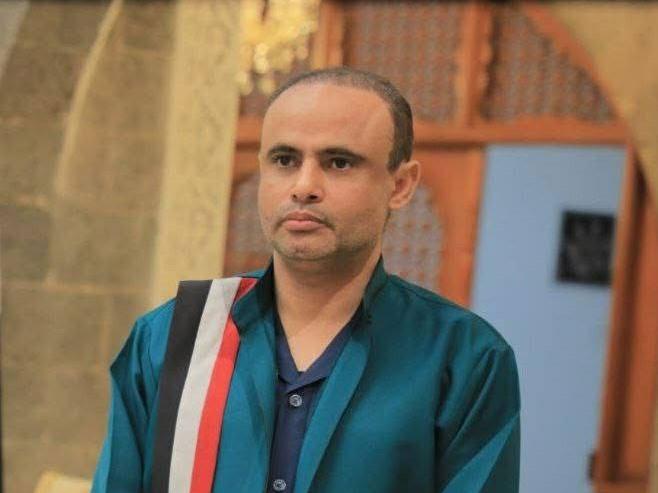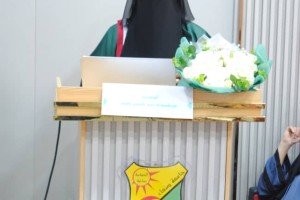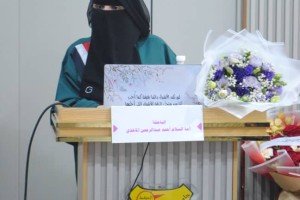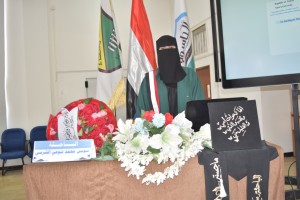Sana’a University’s Faculty of Commerce and Economics Awards Master’s Degree with Distinction and Honors to Mehdi Al-Mashat in Political Science
- Categories Letters and Promotions - Graduate Studies, news, Regulations - Postgraduate Studies
- Date February 18, 2025

Sana’a – Tuesday, February 18, 2025
In a Public Viva-Voce session held today at the Faculty of Commerce and Economics, Sana’a University, the researcher, Mahdi Mohammed Hussein Al-Mashat, was awarded a Master’s degree with distinction and honors in Political Science, specializing in Political Systems . His thesis, titled “ The September 21st Revolution and Its Impact on the Republic of Yemen and the Arab Region ,” was widely praised for its depth and analytical rigor.
The study aimed to analyze the roots of the February 11th Revolution, the role of political forces in the peaceful youth uprising, and the effects of the September 21st, 2014 Revolution on Yemen and the broader Arab region. It also focused on the influence of external interventions and their impact on the course of events.
The Viva Voce Committee, chaired by Dr. Ashwaq Ahmed Ghulais, including Dr. Hani Obadi Mughalis and Dr. Abdullah Mansour Hubaish, commended the thesis for its comprehensive content and significant findings. The committee recommended that the university fund the publication of the thesis and its circulation among universities and other academic institutions for further reference.
Key Findings of the Study:
1. The September 21st Revolution was a genuine popular uprising that involved all segments of Yemeni society across political and social spectrums. It emerged as a necessary response to foreign interventions that threatened Yemen’s sovereignty and the well-being of its people. It reflects the historical and contemporary will of the Yemeni people and poses no threat except to those who conspire against Yemen’s stability.
2. The September 21st Revolution has deep roots and everlasting significance that will extend to future generations. Yemen’s strategic geographic location, diverse natural resources, and dynamic human capital have historically made it a target for foreign powers.
3. The study emphasized that overt foreign interference remains the most significant obstacle to Yemen’s progress and development, regardless of the motives behind it. The revolution exposed false claims and narratives propagated by Yemen’s adversaries; at the same time, it upheld international norms, including maritime navigation safety.
4. The September 21st Revolution achieved the Yemeni people’s aspiration to reject foreign guardianship, securing freedom and independence for the nation. It also empowered the Yemeni people to resist any external conspiracies and exposed the falsehoods propagated by the revolution’s adversaries.
Recommendations from the Study :
1. The September 21st Revolution should be incorporated into educational curricula to highlight its historical significance for future generations. Universities and research centers are encouraged to conduct further studies on the revolution.
2. The revolution’s martyrs and heroes should be honored and commemorated through documentation to ensure the revolution’s goals are preserved. The Ministry of Culture is urged to support creative works and writings about the revolution across various fields.
3. Seminars, conferences, and academic discussions should be organized to study the September 21st Revolution in greater depth, as there is a lack of sufficient research on the subject. This will help the Yemeni people better understand the revolution’s goals, the circumstances that led to it, and the sacrifices made.
4. The events, leaders, and different participants of the September 21st Revolution should be thoroughly documented to remind citizens of its importance, the challenges it faced, and the objectives of its adversaries.
The researcher also emphasized the importance of providing material and moral support to the families of the revolution’s martyrs and the wounded, as well as commemorating its heroes through establishing national memorials, medals, and other forms of recognition.
The viva voce session was attended by numerous academics, researchers, and colleagues of the researcher, reflecting the significance of the study and its contributions to understanding Yemen’s modern political landscape.
Discover more from Sana'a University
Subscribe to get the latest posts sent to your email.
Previous post
Sana'a University's Faculty of Science Honors One of its Distinguished Scientists, Prof. Yahya Bazara'a
Next post






